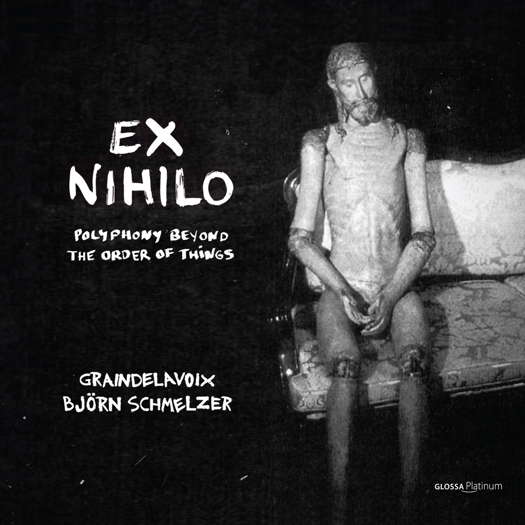ARTICLES BEING VIEWED NOW:
- Régine Crespin
- Hector Berlioz
- Ruth Railton
- Marián Varga
- Profile. A Very Positive Conductor - Paul Bodine talks to Los Angeles Opera's Music Director Designate, Domingo Hindoyan

Creating out of Nothing
GERALD FENECH recommends polyphony from the Belgian ensemble Graindelavoix
'... compelling ardour and moving beauty ...'
'Ex Nihilo' - this is the very strange title of this extraordinary issue, a title that I am sure will set your curiosity going as it did mine. Freely translated, 'Ex Nihilo' means 'Creating with nothingness', but, after all, what is really the gist of the subject that this music wants to put into perspective?
No-one who sought to defend polyphony in the late Middle Ages or Renaissance would have done so by invoking the nothingness from which it creates or by claiming that it lacks substance and significance, being merely the voicing of an emptiness. Yet this is precisely what Johannes Molanus, a Flemish Protestant pedagogue, does in a letter of 1561 when he writes:
Mensural polyphony is a singing without sense or content, in which the voices are resounding emptily in so-called proses, motets and artificial songs in foreign languages, ornamented for the delectation of the ears, which have no meaning that could be understood even by the singers themselves.
Listen — Jacob Obrecht: Salve Regina
(GCDP32119 track 10, 0:00-0:55) ℗ 2024 note 1 music gmbh :
Evidently Molanus is not making the case for polyphony here; on the contrary, his intention is to discredit it, to make it obsolete by emphasizing its affection and hollow core. For Molanus, the voices of mensural polyphony resound in a void and the ultimate proof of its superfluousness is the fact that even the performers of this music do not comprehend what they are singing. Despite his scepticism however, the pedagogue's formulation paradoxically captures something crucial about polyphony - indeed, rarely has the point been put so aptly; polyphony owes its existence to the bizarre articulation of a void, an articulation that is itself void of content and meaning.
On this latest recording for the Glossa label, Graindelavoix and Björn Schmelzer present a fascinating array of Renaissance motets based on the theological concept of 'creatio ex nihilo' (creating out of nothing), as exemplified in the mystery of the beginning of time coming into existence through Jesus, God's begotten Son, who became incarnate and has both Divine and Human nature.
Indeed, St John the Evangelist reveals that all things were created through the Son, and without Him nothing could come into being. When there was nothingness, everything took on shape and life through the creative power of God's beloved Son.
Listen — Josquin Desprez: Praeter rerum seriem
(GCDP32119 track 1, 0:01-0:57) ℗ 2024 note 1 music gmbh :
The programme includes well-known pieces like Josquin Desprez's Praeter rerum seriem, combined with less famous works by the same composer and other very fine contributions by Jacob Obrecht, Johannes Ockeghem, Bernardino de Ribera and Giaches de Wert.
Listen — Giaches de Wert: Vox in Rama
(GCDP32119 track 12, 0:00-0:59) ℗ 2024 note 1 music gmbh :
Apart from the 1561 Molanus quote cited above, Schmelzer himself adds:
Polyphony owes its existence to the bizarre articulation of a void of content and meaning - in no way polyphony improves intelligibility or contributes to a greater understanding of the liturgical texts, having in fact the reverse effect ...
Listen — Bernardino de Ribera: Vox in Rama
(GCDP32119 track 11, 5:26-6:26) ℗ 2024 note 1 music gmbh :
The Belgian ensemble, under Schmelzer's inspired direction, performs these pieces with compelling ardour and moving beauty that result in soundscapes which are as provocative as they are richly coloured. Luscious sound quality and some brilliant annotations complete this superb addition to the Schmelzer catalogue. Recommended, but a slight caution would not be amiss.
Copyright © 11 November 2024
Gerald Fenech,
Gzira, Malta




